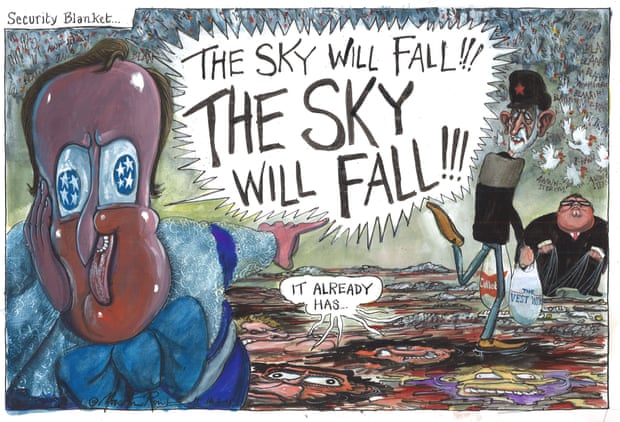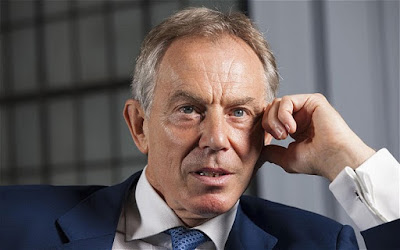Warning, continuing might take you into an immoderate rant zone.
Increasingly I'm finding that I wake up in the morning, read my Guardian, turn on the Today programme on Radio 4, then hold my head in my hands and cringe, saying to myself and to no one in particular but the world in general – “Oh, good grief" (or words to that effect). That’s if I'm not already hurling abuse and invective in all directions, which is not a good way to start the day when you have to keep your blood pressure low.
There's no getting away from the fact that the role of Cameron's Britain in the EU is embarassing: GB is seen as the dickhead of Europe; the one who never offers to buy a round; the precious little boy who thinks he is special and the standards by which the rest of the world is judged do not apply to him. The rules by which everyone else is judged just do not apply to Britain, because Britain is special. Britain is so special that British nationalism isn’t nationalist at all. We can refuse to help the rest of the world because we need to look after our own people first, and it’s not nationalist to make your compassion and care contingent on a person’s passport as long as their passport is British.
Britain is the one who is asked to help in a humanitarian crisis but pleads that it might affect its car insurance payments (thank you for that, Daily Mail). Britain is the country where the first response of the press to a humanitarian crisis washing up on the shores of the Mediterranean is to complain that British holiday makers had their holidays in Greece ruined because they were reminded that there is suffering in the world (thank you, Daily Express, for that compassionate headline).
We’re surrounded by water and that makes us special: a barrier which means that we’re exempt from giving a toss about the refugees trekking across the continent as a result of the havoc that the West has helped to bring about. You can walk along a Hungarian highway but Britain has no place for you, unless you’re a global finance company, a multimillionaire, an oligarch, a deposed dictator, an arms dealer or a banker. Britain only has a place for the rich and the powerful, the people who don’t need refuge. You don’t get to be rich and powerful by being a nice person. Sometimes it seems as if Britain only has a place for the utter bastards of this world. Utter bastardy is what the Tories expect us to aspire to. These are the new British values and they’re cringeworthy and loathsome.
People are dying, fleeing death, escaping from oppression and slavery, risking everything and being left with nothing, and the British government refers to them as migrants who are seeking a better life – as if they were contestants on Wish You Were Here who are viewing properties in Majorca and comparing the sizes of swimming pools. Back in the real world that the refugees are in, the swimming pool contains a dead body, face down.
After a very luke-warm start our government is now trying to fudge the numbers, hinting that they may allow a few dozen more here, a couple of hundred more there to seek shelter in the UK. At the same time they seem intent on adding to the bombs that are already falling on Syrian cities. Kobani and Aleppo stand in ruins, flattened and destroyed. Yes, what they really need are more bombs. Not any old bombs but British bombs. Because British bombs are virtuous and problem solving bombs. British bombs blow things up in constructive and helpful ways, unlike Syrian bombs. Will they never learn? Military intervention does not work.

Turning now to the numbers. Sweden, which has a population of just 8 million, has given refuge to over 40,000. Tiny Lebanon has received 1.2 million across its border with Syria. There are 1.8 million in Turkey. Germany has said that it will receive 800,000. Yet the maximum figure being bandied about by Cameron is 15,000, and even that figure is only being aired after the immense pressure of an outraged populace disgusted by how the UK is showing itself to be the Ebenezer Scrooge of international relief.
It’s not like there is nowhere for the refugees to go. Britain could house them in the grace and favour spare bedrooms of the Royal Family, in the thousands of empty flats and houses owned by offshore tax dodgers, in the empty office space built by speculators. The British establishment tells us that it doesn’t want an EU wide settlement to ensure that every European country has to take its fair share of refugees because they want the EU to be a commercial organisation. The EU should only benefit big business and capital, not people. And that’s the sentiment that also lies behind government in this country. The UK exists to service capital, and so does its people. That’s why there’s so much focus on forcing the disabled into work, because unless you’re making money for someone else you have no value or worth in Britain. At least I can say it wasn't my vote that helped Cameron and his cronies back into power. None of this is in my name. Is it in yours?

























